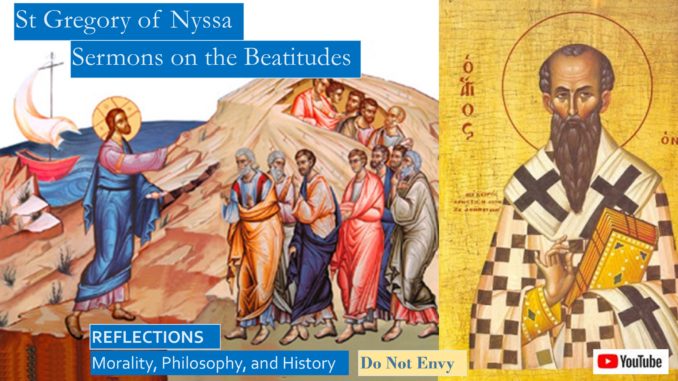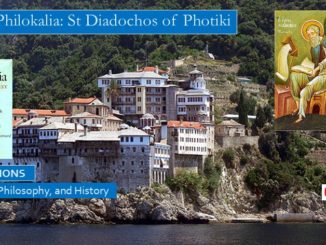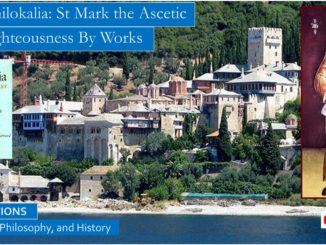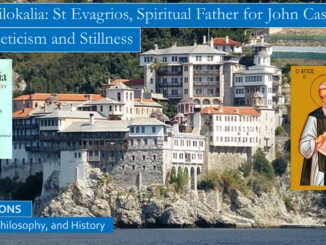
St Gregory of Nyssa’s collection of sermons on the Beatitudes is quoted twice in the Catholic Catechism’s discussion on the commandment, DO NOT ENVY. At first blush that seems odd, the Beatitudes do not directly mention envy, but when you think of the Beatitudes as positive commands, as encouragements to Love God and our neighbor more deeply, promising blessings to those whose hearts are humble, we realize that the connection between the Beatitudes is quite natural and not odd at all, for the commandment DO NOT envy is also a positive command to see our neighbor in the best light possible, to see our neighbor’s good fortune as our good fortune, to truly love our neighbor as ourselves.
When we are envy we do not love, when we are jealous we are not loving, when we gossip we are not kind. When we are consumed with envy, when we gossip constantly, we risk progressing to plotting evil to harm our neighbor. When we truly love our neighbor, we want to think the best of him; when we envy what our neighbor has or what our neighbors can do, we want to see the worst in him. When we envy our neighbor, we see him not truly deserving what he has, for what he has should belong to us.
St Gregory of Nyssa, Beatitudes, Blog 1, The Allegory of the Cave
http://www.seekingvirtueandwisdom.com/st-gregory-of-nyssa-beatitudes-blog-1-the-allegory-of-the-cave/
YouTube video for Blogs 2 – 5: https://youtu.be/xaqFTPgoDI0
YouTube script for more book links: https://www.slideshare.net/BruceStrom1/st-gregory-of-nyssa-on-the-beatitudes-and-the-commandment-do-not-envy
What is Beatitude? St Gregory of Nyssa teaches us that “beatitude is a possession of all things held to be good, from which nothing is absent that a good desire may want.” What is the opposite of Beatitude? “The opposite of beatitude is misery, being tormented unwillingly with painful sufferings.” The man who loves relishes life, the man who envies is forever miserable in his abundance, the man driven by envy never has enough. The man who loves has an inexhaustible treasure that never diminishes no matter how much of it he shares with his neighbor, the treasure of “beatitude, an inexpressible beauty which is very grace, wisdom, and power; this true light that is the fount of all goodness, wisdom, and power; mighty above all else, lovable, unchanging, rejoicing without end in infinite happiness.” Those who love are forever happy, those who envy wallow in their misery.[1]
The first Beatitude in Matthews reads, “Blessed are the poor in spirit, for theirs is the kingdom of heaven.”[2]
Lest we be misled that we should only care for the poor in spirit, that we do not need to care for the truly poor, this same Beatitude in Luke reads, “Blessed are you who are poor, for yours is the kingdom of God.”[3]
St Gregory of Nyssa teaches we should not deprecate either version of this first and most beautiful Beatitude, “What then is this poverty of spirit through which we come to possess the Kingdom of Heaven? We know from Scripture that there are two kinds of riches, one desired, the other condemned. The riches of virtue are to be pursued, but material wealth is to be rejected; for one saves the soul, the other deceives the senses.”
SEE OUR BLOG ON DO NOT ENVY, The Catholic Catechism
Here the Catholic Catechism quotes St Gregory of Nyssa, “Jesus celebrates the joy of the poor, to whom the Kingdom already belongs. The Word speaks of voluntary humility as ‘poverty in spirit.’[4] The Apostle gives an example of God’s poverty when He says, ‘For your sakes he became poor.’”[5]
What is poverty of spirit? St Gregory of Nyssa teaches that “poverty of spirit is voluntary humility.” Jesus is our living example of voluntary humility, the “Apostle tells us of the poverty of God when he says, ‘Who for us became poor, being rich, that through His poverty we might be rich.’ “Humility should be like a “brother to us who walk on the ground,” we who are men made from dust and who will return to the dust. “If you imitate God in what is possible in your nature, you will yourself have put on the blessed form.”
St Gregory of Nyssa agrees with Plato that our effort is required to climb out of the cave of ignorance and up the mountain of love. We need God’s grace, but we also need to expend effort, praying without ceasing, never taking our eyes off the face of Jesus. St Gregory of Nyssa warns us, “Let no one imagine that humility can be achieved easily and without effort. On the contrary, humility requires more effort than the practice of any other virtue. Why? Though man had received good sees, the chief of the opposite seeds – the tares of pride – sown by the enemy of our life, took root while man was sleeping.” Satan fell because of pride, he wants men to follow him into the abyss.
With pathos in poetry St Gregory of Nyssa asks, “What greater poverty is there for God than the form of a servant? What is more than for the King of creation to share in our poor nature? The Ruler of rules, the Lord of lords puts on voluntarily the garb of servitude. The Judge of all becomes a subject of governors; the Lord of creation dwells in a cave; He who holds the universe in His hands finds no place in the inn, but is cast aside into the manger of irrational beasts.” Christ is our example of living in humility.
St Gregory of Nyssa asks, who is that is poor in spirit? “He who is given the riches of the soul in exchange for material wealth, who is poor for the sake of the spirit. He who has shaken off earthly riches like a burden so he may lightly be lifted up into the air, as says the Apostle, ‘in the cloud walking on high together with God.’”[6]
We in the modern world cannot as readily shed our possessions, giving them to the poor, for if we do not have a house we cannot readily live on the street and be a benefit for anybody. We cannot beg for sustenance like St Francis. But that does not mean that we should center our lives on accumulating ever more possessions.
We must not be like the rich man in the parable in Luke:
Then Jesus told them a parable: “The land of a rich man produced abundantly. And he thought to himself, ‘What should I do, for I have no place to store my crops?’ Then he said, ‘I will do this: I will pull down my barns and build larger ones, and there I will store all my grain and my goods. And I will say to my soul, Soul, you have ample goods laid up for many years; relax, eat, drink, be merry.’ But God said to him, ‘You fool! This very night your life is being demanded of you. And the things you have prepared, whose will they be?’ So it is with those who store up treasures for themselves but are not rich toward God.”[7]
We must be the possessor of our possessions, we must keep up our guard lest we wake up one day as slaves possessed by our possessions. Misers are mean and miserable, instead be generous and kind and loving.
St Gregory of Nyssa, Beatitudes, Blog 3, Blessed are the Meek and Those Who Mourn
http://www.seekingvirtueandwisdom.com/st-gregory-of-nyssa-beatitudes-blog-3-blessed-are-the-meek-and-those-who-mourn/
[1] St Gregory of Nyssa, “On Beatitudes,” Sermon 1, in The Lord’s Prayer, the Beatitudes, translated by Hilda C Graff, (New York: Paulist Press, 1954) pp. 85-89.
[2] https://www.biblegateway.com/passage/?search=matthew+5&version=NRSVCE
[3] https://www.biblegateway.com/passage/?search=luke+6%3A20&version=NRSVCE
[4] “Catechism of the Catholic Church, 2nd Edition” (Washington DC: US Catholic Conference: 1994), p. 609, paragraph 2546.
[5] https://www.biblegateway.com/passage/?search=2+corinthians+8%3A9&version=NRSVCE
[6] St Gregory of Nyssa, “On Beatitudes,” pp. 89-96.
[7] https://www.biblegateway.com/passage/?search=luke+12%3A16-21&version=NRSVCE





4 Trackbacks / Pingbacks